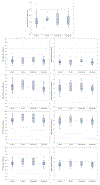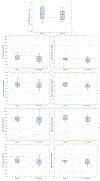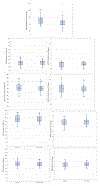Reduction in cerebral oxygen metabolism in subcortical regions may be a biomarker of cognitive decline in people living with human immunodeficiency virus
- PMID: 34821434
- PMCID: PMC12226027
- DOI: 10.1111/ene.15196
Reduction in cerebral oxygen metabolism in subcortical regions may be a biomarker of cognitive decline in people living with human immunodeficiency virus
Abstract
Background and purpose: Regional cerebral blood flow (rCBF) and oxygen metabolism (rCMRO2 ) in whole brain, white matter, gray matter and lenticular nuclei were studied in people living with human immunodeficiency virus (PLHIV) as well as HIV-associated neurocognitive disorder (HAND).
Methods: Treatment-naïve PLHIV underwent neurocognitive assessment and magnetic resonance (MR) measurement of rCBF and rCMRO2 with repeat after 12 months of antiretroviral therapy (ART). Age- and sex-matched controls underwent single MR measurements. Regional CBF and rCMRO2 were compared amongst symptomatic, asymptomatic, normal HAND and controls using analysis of variance. Longitudinal analysis of HAND worsening (≥1 category) was assessed after 12 months of ART and correlated with rCBF and rCMRO2 measured by MR imaging using the paired-sample t test.
Results: Thirty PLHIV completed baseline and 12-month assessments (29 with rCMRO2 measurement). At baseline HAND assessment, 13% had no cognitive impairment, 27% had asymptomatic neurocognitive impairment, 60% had mild neurocognitive disorder and none had HIV-associated dementia. At 12 months, 13% had no cognitive impairment, 20% had asymptomatic neurocognitive impairment, 50% had mild neurocognitive disorder and 17% had HIV-associated dementia. In those without HAND worsening (N = 21) rCMRO2 remained stable and in those with HAND worsening (N = 8) rCMRO2 measurement declined from baseline to 12 months in white matter (2.05 ± 0.40 to 1.73 ± 0.51, p = 0.03) and lenticular nuclei (4.32 ± 0.39 to 4.00 ± 0.51, p = 0.05).
Conclusions: In recently diagnosed PLHIV, no association was found between rCBF or rCMRO2 and cognitive impairment at baseline. There was a reduction in rCMRO2 in those with worsening of cognitive function at 12 months on ART. Reduction in rCMRO2 may be a biomarker of cognitive decline in PLHIV.
Keywords: HAND; HIV; antiretroviral therapy; cerebral blood flow; cerebral oxygen metabolism.
© 2021 European Academy of Neurology.
Conflict of interest statement
CONFLICT OF INTEREST
The authors have reported no conflicts of interest.
Figures





Similar articles
-
Antithrombotic therapy to prevent cognitive decline in people with small vessel disease on neuroimaging but without dementia.Cochrane Database Syst Rev. 2022 Jul 14;7(7):CD012269. doi: 10.1002/14651858.CD012269.pub2. Cochrane Database Syst Rev. 2022. PMID: 35833913 Free PMC article.
-
Dance movement therapy for dementia.Cochrane Database Syst Rev. 2023 Aug 7;8(8):CD011022. doi: 10.1002/14651858.CD011022.pub3. Cochrane Database Syst Rev. 2023. PMID: 37549216 Free PMC article.
-
Folic acid with or without vitamin B12 for cognition and dementia.Cochrane Database Syst Rev. 2003;(4):CD004514. doi: 10.1002/14651858.CD004514. Cochrane Database Syst Rev. 2003. Update in: Cochrane Database Syst Rev. 2008 Oct 08;(4):CD004514. doi: 10.1002/14651858.CD004514.pub2. PMID: 14584018 Updated.
-
Clinical judgement by primary care physicians for the diagnosis of all-cause dementia or cognitive impairment in symptomatic people.Cochrane Database Syst Rev. 2022 Jun 16;6(6):CD012558. doi: 10.1002/14651858.CD012558.pub2. Cochrane Database Syst Rev. 2022. PMID: 35709018 Free PMC article.
-
Pharmacotherapies for sleep disturbances in dementia.Cochrane Database Syst Rev. 2016 Nov 16;11(11):CD009178. doi: 10.1002/14651858.CD009178.pub3. Cochrane Database Syst Rev. 2016. Update in: Cochrane Database Syst Rev. 2020 Nov 15;11:CD009178. doi: 10.1002/14651858.CD009178.pub4. PMID: 27851868 Free PMC article. Updated.
References
-
- Palella FJ, Delaney KM, Moorman AC, et al. Declining morbidity and mortality among patients with advanced human immunodeficiency virus infection. N Engl J Med. 1998;338:853–860. - PubMed
-
- Alford K, Vera JH. Cognitive impairment in people living with HIV in the ART era: a review. Br Med Bull. 2018;127:55–68. - PubMed
-
- Su T, Mutsaerts HJ, Caan MW, et al. Cerebral blood flow and cognitive function in HIV-infected men with sustained suppressed viremia on combination antiretroviral therapy. AIDS. 2017;31:847–856. - PubMed
Publication types
MeSH terms
Substances
Grants and funding
LinkOut - more resources
Full Text Sources
Medical

